EasyJet Airline: Factors Influencing Passenger Travel Decisions Report
VerifiedAdded on 2020/12/24
|13
|3880
|388
Report
AI Summary
This report provides an in-depth analysis of the factors influencing passenger travel decisions, focusing on the airline company EasyJet. It examines key elements such as pricing strategies, the quality of services offered, and the impact of brand recognition on customer choices. The report also explores Porter's generic strategies, including cost leadership, differentiation, and focus, and how these strategies can be applied within the airline industry. Furthermore, it delves into various tour plans and the structure of the tour operations business, including the different types of tour operators and the role of travel agencies. The report also discusses the retail travel environment and the relationships between different types of travel agencies. Overall, this report offers a comprehensive overview of the airline and tour operations sectors, highlighting the critical factors that influence passenger behavior and the strategic approaches employed by companies like EasyJet to succeed in a competitive market.
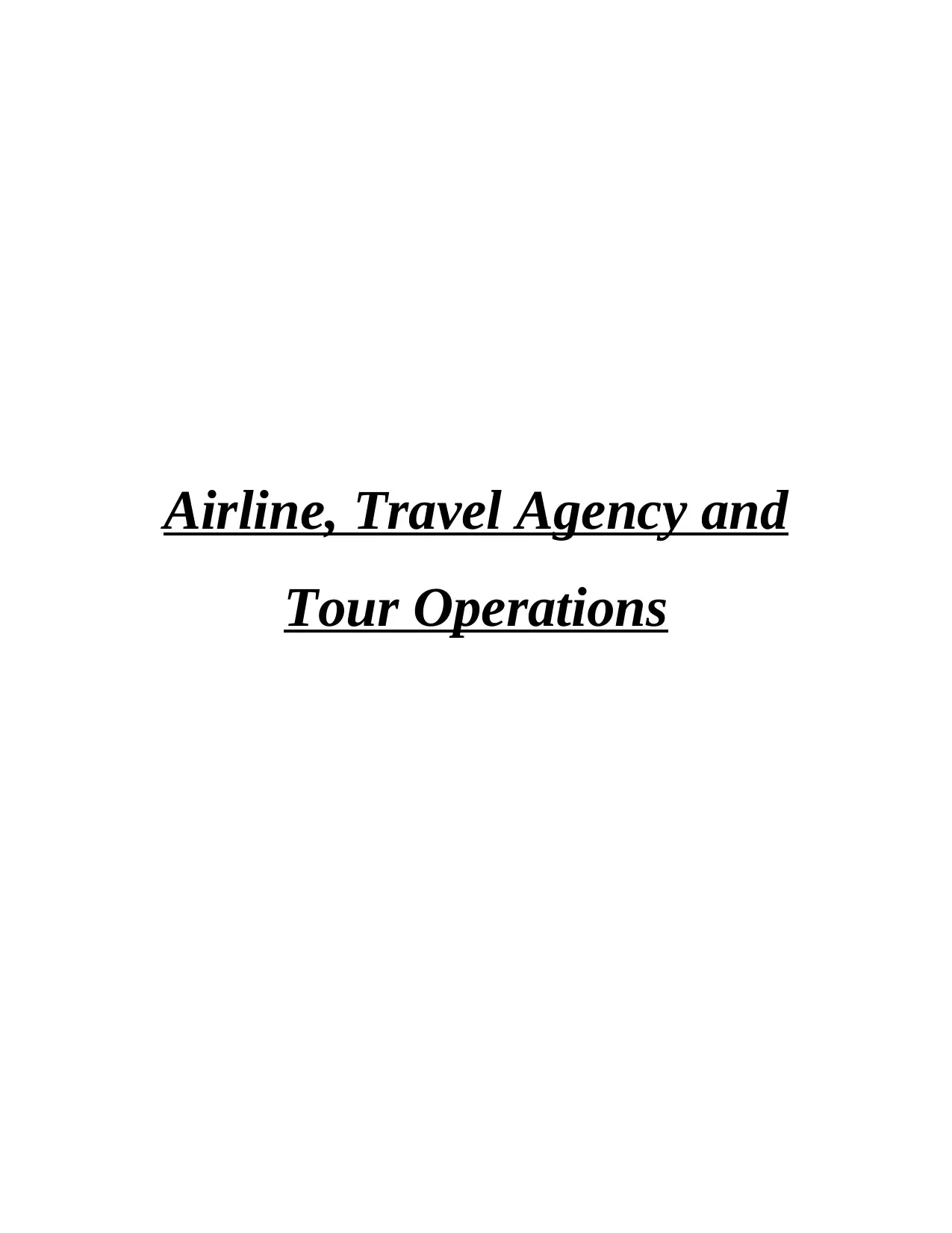
Airline, Travel Agency and
Tour Operations
Tour Operations
Paraphrase This Document
Need a fresh take? Get an instant paraphrase of this document with our AI Paraphraser
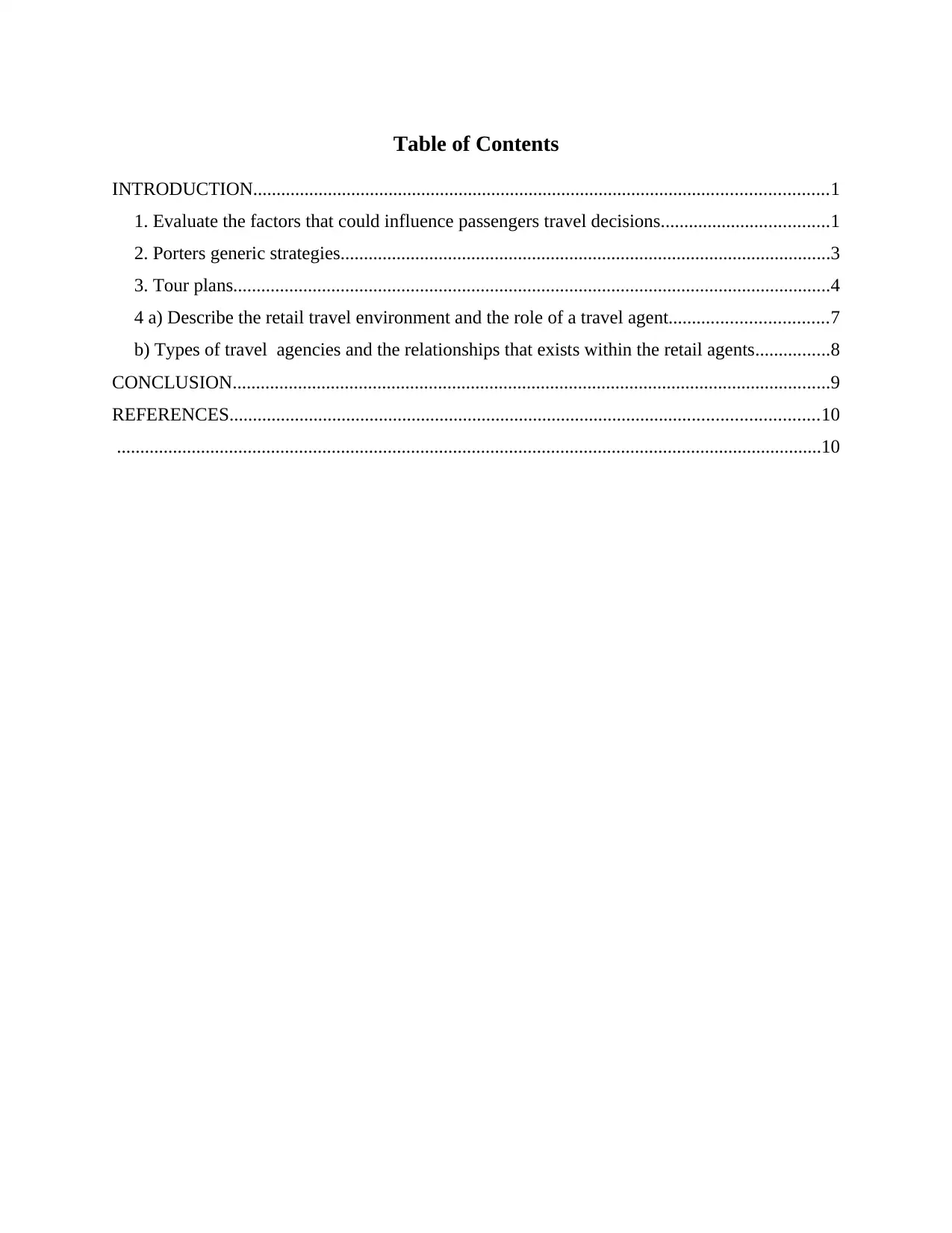
Table of Contents
INTRODUCTION...........................................................................................................................1
1. Evaluate the factors that could influence passengers travel decisions....................................1
2. Porters generic strategies.........................................................................................................3
3. Tour plans................................................................................................................................4
4 a) Describe the retail travel environment and the role of a travel agent..................................7
b) Types of travel agencies and the relationships that exists within the retail agents................8
CONCLUSION................................................................................................................................9
REFERENCES..............................................................................................................................10
.......................................................................................................................................................10
INTRODUCTION...........................................................................................................................1
1. Evaluate the factors that could influence passengers travel decisions....................................1
2. Porters generic strategies.........................................................................................................3
3. Tour plans................................................................................................................................4
4 a) Describe the retail travel environment and the role of a travel agent..................................7
b) Types of travel agencies and the relationships that exists within the retail agents................8
CONCLUSION................................................................................................................................9
REFERENCES..............................................................................................................................10
.......................................................................................................................................................10

⊘ This is a preview!⊘
Do you want full access?
Subscribe today to unlock all pages.

Trusted by 1+ million students worldwide
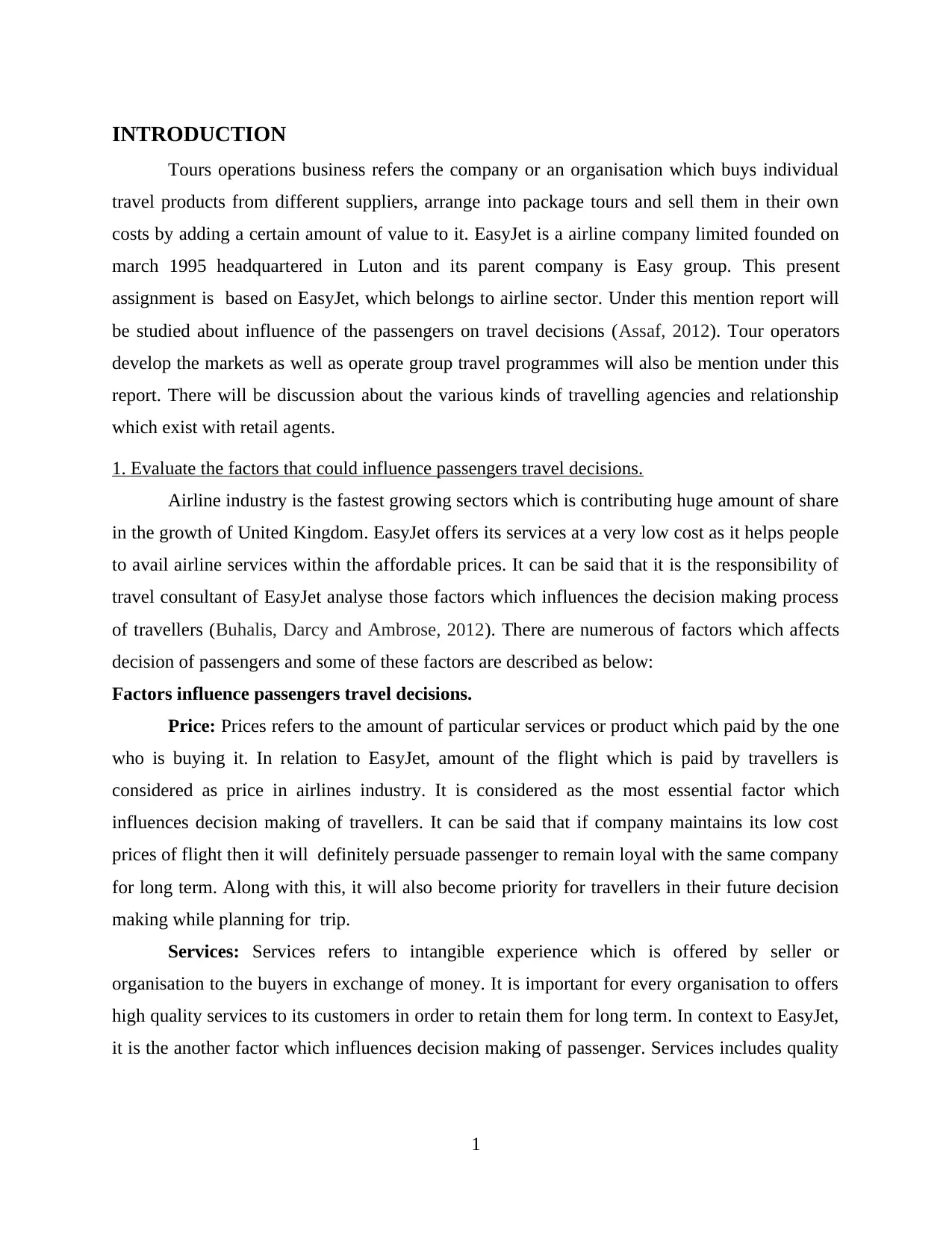
INTRODUCTION
Tours operations business refers the company or an organisation which buys individual
travel products from different suppliers, arrange into package tours and sell them in their own
costs by adding a certain amount of value to it. EasyJet is a airline company limited founded on
march 1995 headquartered in Luton and its parent company is Easy group. This present
assignment is based on EasyJet, which belongs to airline sector. Under this mention report will
be studied about influence of the passengers on travel decisions (Assaf, 2012). Tour operators
develop the markets as well as operate group travel programmes will also be mention under this
report. There will be discussion about the various kinds of travelling agencies and relationship
which exist with retail agents.
1. Evaluate the factors that could influence passengers travel decisions.
Airline industry is the fastest growing sectors which is contributing huge amount of share
in the growth of United Kingdom. EasyJet offers its services at a very low cost as it helps people
to avail airline services within the affordable prices. It can be said that it is the responsibility of
travel consultant of EasyJet analyse those factors which influences the decision making process
of travellers (Buhalis, Darcy and Ambrose, 2012). There are numerous of factors which affects
decision of passengers and some of these factors are described as below:
Factors influence passengers travel decisions.
Price: Prices refers to the amount of particular services or product which paid by the one
who is buying it. In relation to EasyJet, amount of the flight which is paid by travellers is
considered as price in airlines industry. It is considered as the most essential factor which
influences decision making of travellers. It can be said that if company maintains its low cost
prices of flight then it will definitely persuade passenger to remain loyal with the same company
for long term. Along with this, it will also become priority for travellers in their future decision
making while planning for trip.
Services: Services refers to intangible experience which is offered by seller or
organisation to the buyers in exchange of money. It is important for every organisation to offers
high quality services to its customers in order to retain them for long term. In context to EasyJet,
it is the another factor which influences decision making of passenger. Services includes quality
1
Tours operations business refers the company or an organisation which buys individual
travel products from different suppliers, arrange into package tours and sell them in their own
costs by adding a certain amount of value to it. EasyJet is a airline company limited founded on
march 1995 headquartered in Luton and its parent company is Easy group. This present
assignment is based on EasyJet, which belongs to airline sector. Under this mention report will
be studied about influence of the passengers on travel decisions (Assaf, 2012). Tour operators
develop the markets as well as operate group travel programmes will also be mention under this
report. There will be discussion about the various kinds of travelling agencies and relationship
which exist with retail agents.
1. Evaluate the factors that could influence passengers travel decisions.
Airline industry is the fastest growing sectors which is contributing huge amount of share
in the growth of United Kingdom. EasyJet offers its services at a very low cost as it helps people
to avail airline services within the affordable prices. It can be said that it is the responsibility of
travel consultant of EasyJet analyse those factors which influences the decision making process
of travellers (Buhalis, Darcy and Ambrose, 2012). There are numerous of factors which affects
decision of passengers and some of these factors are described as below:
Factors influence passengers travel decisions.
Price: Prices refers to the amount of particular services or product which paid by the one
who is buying it. In relation to EasyJet, amount of the flight which is paid by travellers is
considered as price in airlines industry. It is considered as the most essential factor which
influences decision making of travellers. It can be said that if company maintains its low cost
prices of flight then it will definitely persuade passenger to remain loyal with the same company
for long term. Along with this, it will also become priority for travellers in their future decision
making while planning for trip.
Services: Services refers to intangible experience which is offered by seller or
organisation to the buyers in exchange of money. It is important for every organisation to offers
high quality services to its customers in order to retain them for long term. In context to EasyJet,
it is the another factor which influences decision making of passenger. Services includes quality
1
Paraphrase This Document
Need a fresh take? Get an instant paraphrase of this document with our AI Paraphraser
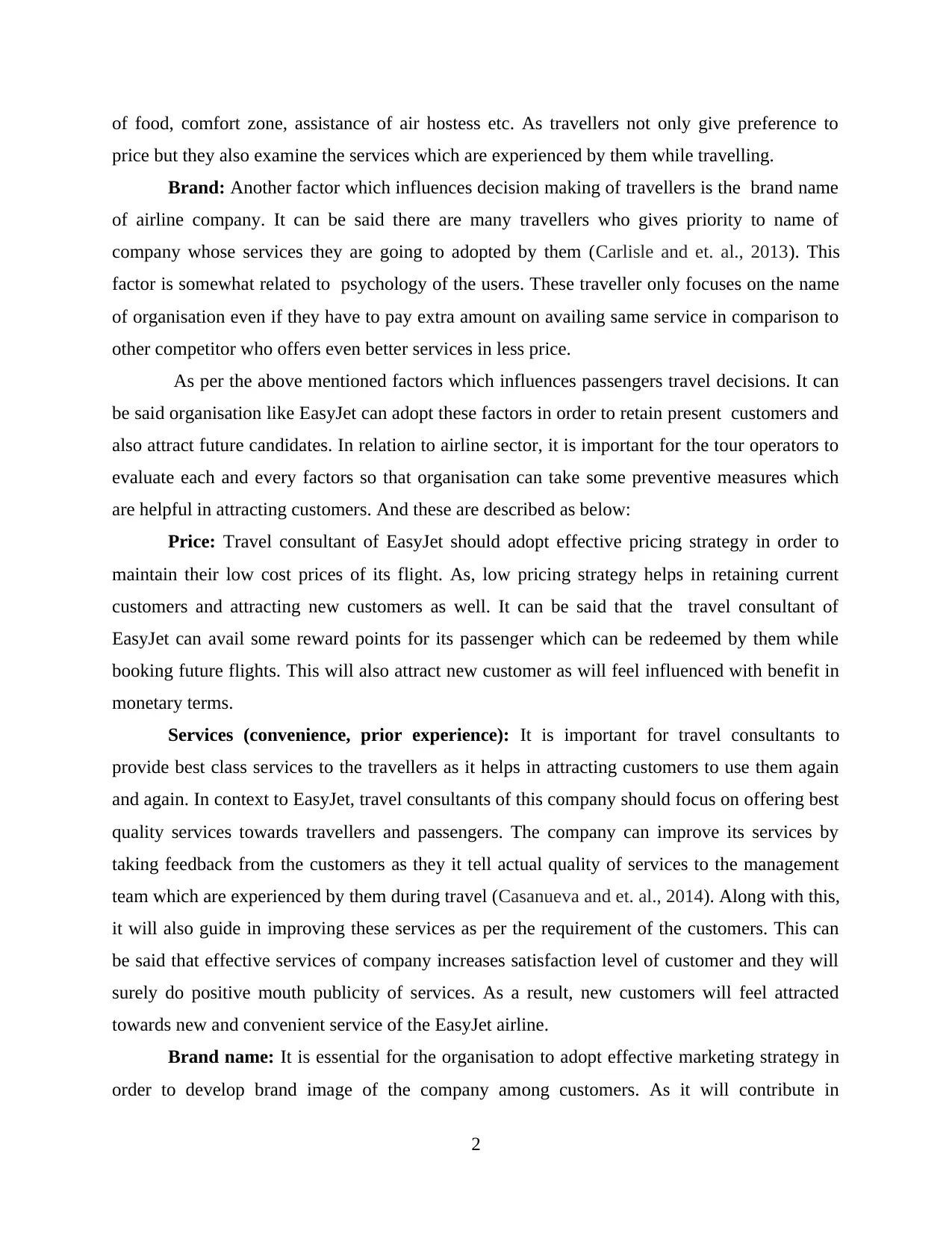
of food, comfort zone, assistance of air hostess etc. As travellers not only give preference to
price but they also examine the services which are experienced by them while travelling.
Brand: Another factor which influences decision making of travellers is the brand name
of airline company. It can be said there are many travellers who gives priority to name of
company whose services they are going to adopted by them (Carlisle and et. al., 2013). This
factor is somewhat related to psychology of the users. These traveller only focuses on the name
of organisation even if they have to pay extra amount on availing same service in comparison to
other competitor who offers even better services in less price.
As per the above mentioned factors which influences passengers travel decisions. It can
be said organisation like EasyJet can adopt these factors in order to retain present customers and
also attract future candidates. In relation to airline sector, it is important for the tour operators to
evaluate each and every factors so that organisation can take some preventive measures which
are helpful in attracting customers. And these are described as below:
Price: Travel consultant of EasyJet should adopt effective pricing strategy in order to
maintain their low cost prices of its flight. As, low pricing strategy helps in retaining current
customers and attracting new customers as well. It can be said that the travel consultant of
EasyJet can avail some reward points for its passenger which can be redeemed by them while
booking future flights. This will also attract new customer as will feel influenced with benefit in
monetary terms.
Services (convenience, prior experience): It is important for travel consultants to
provide best class services to the travellers as it helps in attracting customers to use them again
and again. In context to EasyJet, travel consultants of this company should focus on offering best
quality services towards travellers and passengers. The company can improve its services by
taking feedback from the customers as they it tell actual quality of services to the management
team which are experienced by them during travel (Casanueva and et. al., 2014). Along with this,
it will also guide in improving these services as per the requirement of the customers. This can
be said that effective services of company increases satisfaction level of customer and they will
surely do positive mouth publicity of services. As a result, new customers will feel attracted
towards new and convenient service of the EasyJet airline.
Brand name: It is essential for the organisation to adopt effective marketing strategy in
order to develop brand image of the company among customers. As it will contribute in
2
price but they also examine the services which are experienced by them while travelling.
Brand: Another factor which influences decision making of travellers is the brand name
of airline company. It can be said there are many travellers who gives priority to name of
company whose services they are going to adopted by them (Carlisle and et. al., 2013). This
factor is somewhat related to psychology of the users. These traveller only focuses on the name
of organisation even if they have to pay extra amount on availing same service in comparison to
other competitor who offers even better services in less price.
As per the above mentioned factors which influences passengers travel decisions. It can
be said organisation like EasyJet can adopt these factors in order to retain present customers and
also attract future candidates. In relation to airline sector, it is important for the tour operators to
evaluate each and every factors so that organisation can take some preventive measures which
are helpful in attracting customers. And these are described as below:
Price: Travel consultant of EasyJet should adopt effective pricing strategy in order to
maintain their low cost prices of its flight. As, low pricing strategy helps in retaining current
customers and attracting new customers as well. It can be said that the travel consultant of
EasyJet can avail some reward points for its passenger which can be redeemed by them while
booking future flights. This will also attract new customer as will feel influenced with benefit in
monetary terms.
Services (convenience, prior experience): It is important for travel consultants to
provide best class services to the travellers as it helps in attracting customers to use them again
and again. In context to EasyJet, travel consultants of this company should focus on offering best
quality services towards travellers and passengers. The company can improve its services by
taking feedback from the customers as they it tell actual quality of services to the management
team which are experienced by them during travel (Casanueva and et. al., 2014). Along with this,
it will also guide in improving these services as per the requirement of the customers. This can
be said that effective services of company increases satisfaction level of customer and they will
surely do positive mouth publicity of services. As a result, new customers will feel attracted
towards new and convenient service of the EasyJet airline.
Brand name: It is essential for the organisation to adopt effective marketing strategy in
order to develop brand image of the company among customers. As it will contribute in
2
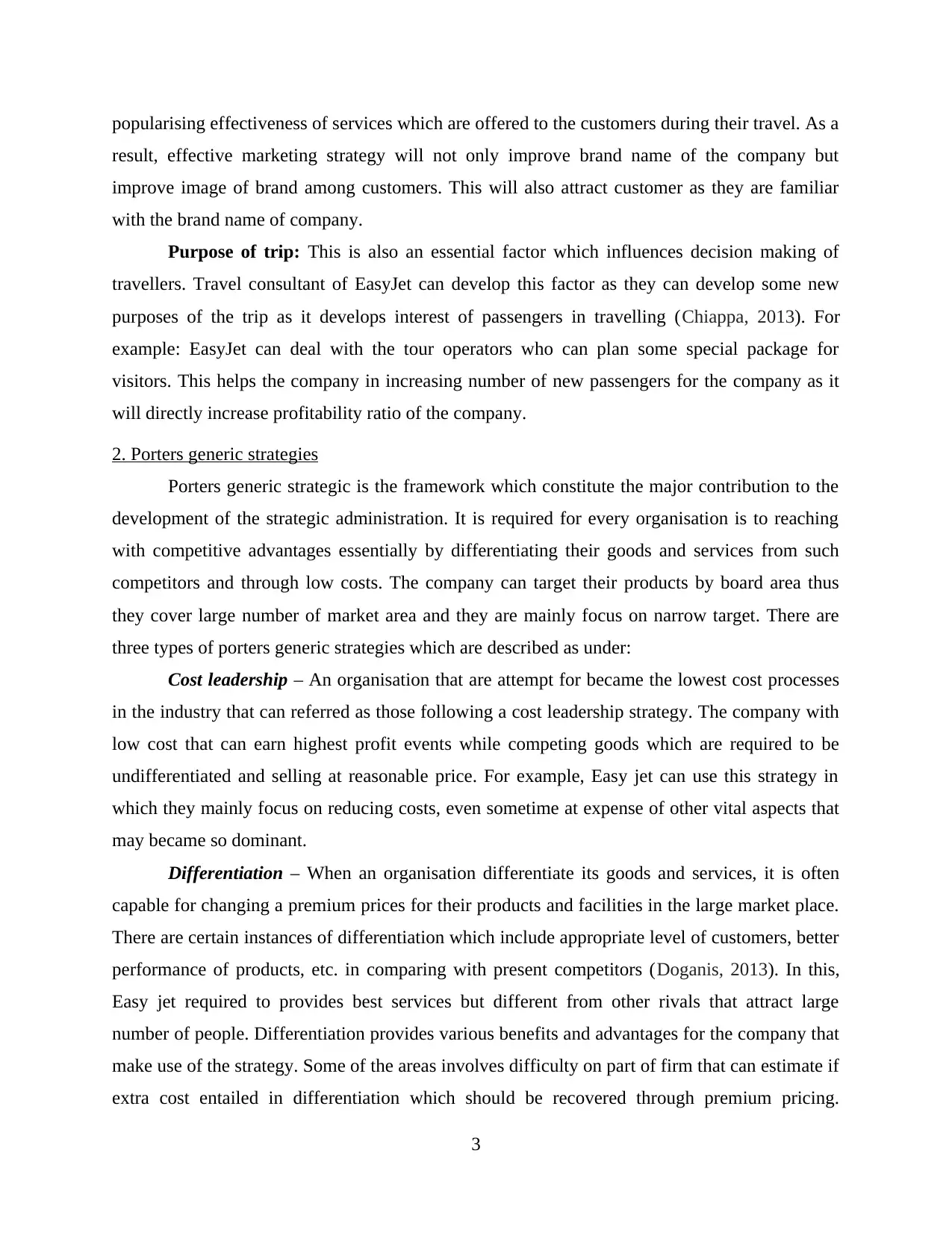
popularising effectiveness of services which are offered to the customers during their travel. As a
result, effective marketing strategy will not only improve brand name of the company but
improve image of brand among customers. This will also attract customer as they are familiar
with the brand name of company.
Purpose of trip: This is also an essential factor which influences decision making of
travellers. Travel consultant of EasyJet can develop this factor as they can develop some new
purposes of the trip as it develops interest of passengers in travelling (Chiappa, 2013). For
example: EasyJet can deal with the tour operators who can plan some special package for
visitors. This helps the company in increasing number of new passengers for the company as it
will directly increase profitability ratio of the company.
2. Porters generic strategies
Porters generic strategic is the framework which constitute the major contribution to the
development of the strategic administration. It is required for every organisation is to reaching
with competitive advantages essentially by differentiating their goods and services from such
competitors and through low costs. The company can target their products by board area thus
they cover large number of market area and they are mainly focus on narrow target. There are
three types of porters generic strategies which are described as under:
Cost leadership – An organisation that are attempt for became the lowest cost processes
in the industry that can referred as those following a cost leadership strategy. The company with
low cost that can earn highest profit events while competing goods which are required to be
undifferentiated and selling at reasonable price. For example, Easy jet can use this strategy in
which they mainly focus on reducing costs, even sometime at expense of other vital aspects that
may became so dominant.
Differentiation – When an organisation differentiate its goods and services, it is often
capable for changing a premium prices for their products and facilities in the large market place.
There are certain instances of differentiation which include appropriate level of customers, better
performance of products, etc. in comparing with present competitors (Doganis, 2013). In this,
Easy jet required to provides best services but different from other rivals that attract large
number of people. Differentiation provides various benefits and advantages for the company that
make use of the strategy. Some of the areas involves difficulty on part of firm that can estimate if
extra cost entailed in differentiation which should be recovered through premium pricing.
3
result, effective marketing strategy will not only improve brand name of the company but
improve image of brand among customers. This will also attract customer as they are familiar
with the brand name of company.
Purpose of trip: This is also an essential factor which influences decision making of
travellers. Travel consultant of EasyJet can develop this factor as they can develop some new
purposes of the trip as it develops interest of passengers in travelling (Chiappa, 2013). For
example: EasyJet can deal with the tour operators who can plan some special package for
visitors. This helps the company in increasing number of new passengers for the company as it
will directly increase profitability ratio of the company.
2. Porters generic strategies
Porters generic strategic is the framework which constitute the major contribution to the
development of the strategic administration. It is required for every organisation is to reaching
with competitive advantages essentially by differentiating their goods and services from such
competitors and through low costs. The company can target their products by board area thus
they cover large number of market area and they are mainly focus on narrow target. There are
three types of porters generic strategies which are described as under:
Cost leadership – An organisation that are attempt for became the lowest cost processes
in the industry that can referred as those following a cost leadership strategy. The company with
low cost that can earn highest profit events while competing goods which are required to be
undifferentiated and selling at reasonable price. For example, Easy jet can use this strategy in
which they mainly focus on reducing costs, even sometime at expense of other vital aspects that
may became so dominant.
Differentiation – When an organisation differentiate its goods and services, it is often
capable for changing a premium prices for their products and facilities in the large market place.
There are certain instances of differentiation which include appropriate level of customers, better
performance of products, etc. in comparing with present competitors (Doganis, 2013). In this,
Easy jet required to provides best services but different from other rivals that attract large
number of people. Differentiation provides various benefits and advantages for the company that
make use of the strategy. Some of the areas involves difficulty on part of firm that can estimate if
extra cost entailed in differentiation which should be recovered through premium pricing.
3
⊘ This is a preview!⊘
Do you want full access?
Subscribe today to unlock all pages.

Trusted by 1+ million students worldwide
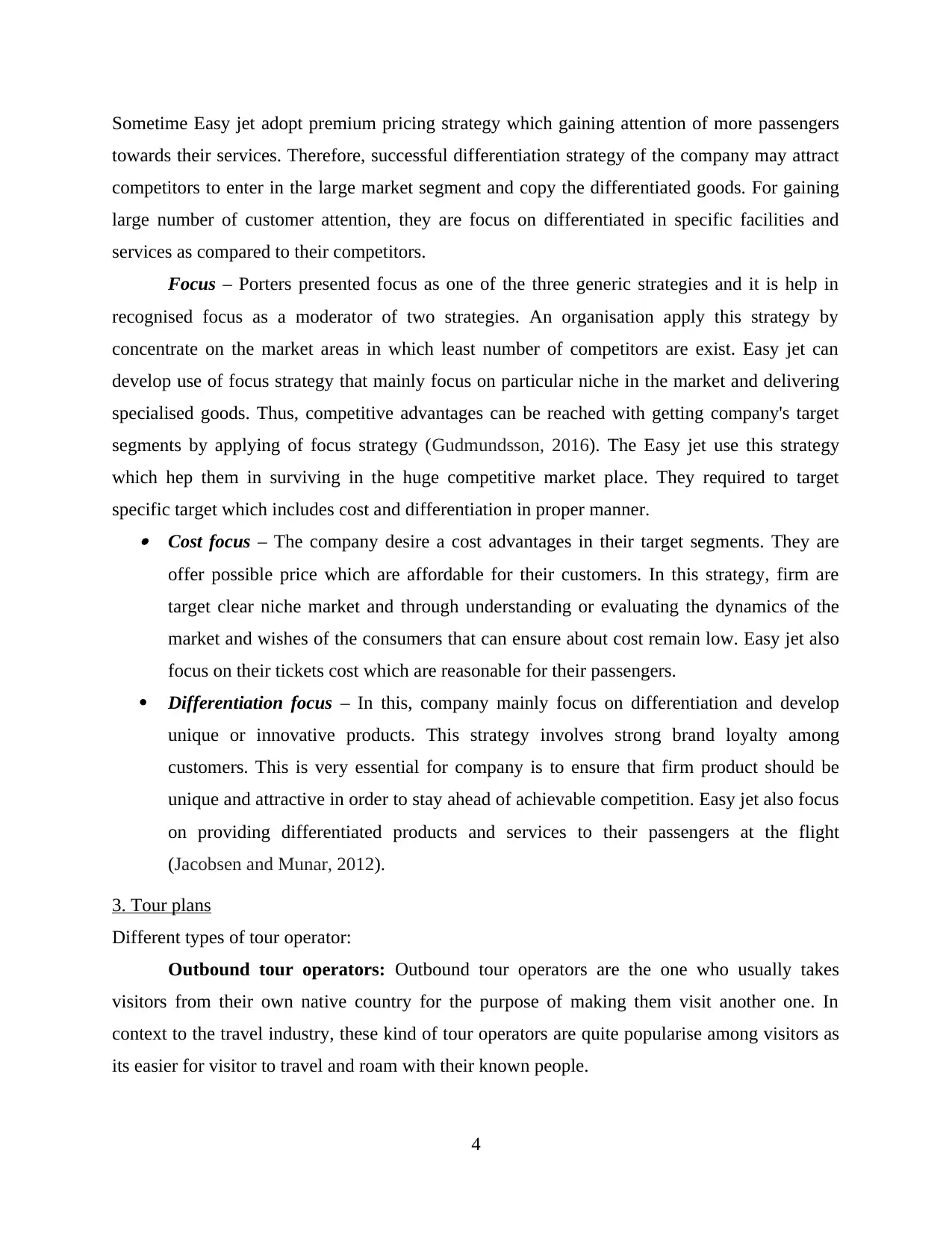
Sometime Easy jet adopt premium pricing strategy which gaining attention of more passengers
towards their services. Therefore, successful differentiation strategy of the company may attract
competitors to enter in the large market segment and copy the differentiated goods. For gaining
large number of customer attention, they are focus on differentiated in specific facilities and
services as compared to their competitors.
Focus – Porters presented focus as one of the three generic strategies and it is help in
recognised focus as a moderator of two strategies. An organisation apply this strategy by
concentrate on the market areas in which least number of competitors are exist. Easy jet can
develop use of focus strategy that mainly focus on particular niche in the market and delivering
specialised goods. Thus, competitive advantages can be reached with getting company's target
segments by applying of focus strategy (Gudmundsson, 2016). The Easy jet use this strategy
which hep them in surviving in the huge competitive market place. They required to target
specific target which includes cost and differentiation in proper manner. Cost focus – The company desire a cost advantages in their target segments. They are
offer possible price which are affordable for their customers. In this strategy, firm are
target clear niche market and through understanding or evaluating the dynamics of the
market and wishes of the consumers that can ensure about cost remain low. Easy jet also
focus on their tickets cost which are reasonable for their passengers.
Differentiation focus – In this, company mainly focus on differentiation and develop
unique or innovative products. This strategy involves strong brand loyalty among
customers. This is very essential for company is to ensure that firm product should be
unique and attractive in order to stay ahead of achievable competition. Easy jet also focus
on providing differentiated products and services to their passengers at the flight
(Jacobsen and Munar, 2012).
3. Tour plans
Different types of tour operator:
Outbound tour operators: Outbound tour operators are the one who usually takes
visitors from their own native country for the purpose of making them visit another one. In
context to the travel industry, these kind of tour operators are quite popularise among visitors as
its easier for visitor to travel and roam with their known people.
4
towards their services. Therefore, successful differentiation strategy of the company may attract
competitors to enter in the large market segment and copy the differentiated goods. For gaining
large number of customer attention, they are focus on differentiated in specific facilities and
services as compared to their competitors.
Focus – Porters presented focus as one of the three generic strategies and it is help in
recognised focus as a moderator of two strategies. An organisation apply this strategy by
concentrate on the market areas in which least number of competitors are exist. Easy jet can
develop use of focus strategy that mainly focus on particular niche in the market and delivering
specialised goods. Thus, competitive advantages can be reached with getting company's target
segments by applying of focus strategy (Gudmundsson, 2016). The Easy jet use this strategy
which hep them in surviving in the huge competitive market place. They required to target
specific target which includes cost and differentiation in proper manner. Cost focus – The company desire a cost advantages in their target segments. They are
offer possible price which are affordable for their customers. In this strategy, firm are
target clear niche market and through understanding or evaluating the dynamics of the
market and wishes of the consumers that can ensure about cost remain low. Easy jet also
focus on their tickets cost which are reasonable for their passengers.
Differentiation focus – In this, company mainly focus on differentiation and develop
unique or innovative products. This strategy involves strong brand loyalty among
customers. This is very essential for company is to ensure that firm product should be
unique and attractive in order to stay ahead of achievable competition. Easy jet also focus
on providing differentiated products and services to their passengers at the flight
(Jacobsen and Munar, 2012).
3. Tour plans
Different types of tour operator:
Outbound tour operators: Outbound tour operators are the one who usually takes
visitors from their own native country for the purpose of making them visit another one. In
context to the travel industry, these kind of tour operators are quite popularise among visitors as
its easier for visitor to travel and roam with their known people.
4
Paraphrase This Document
Need a fresh take? Get an instant paraphrase of this document with our AI Paraphraser
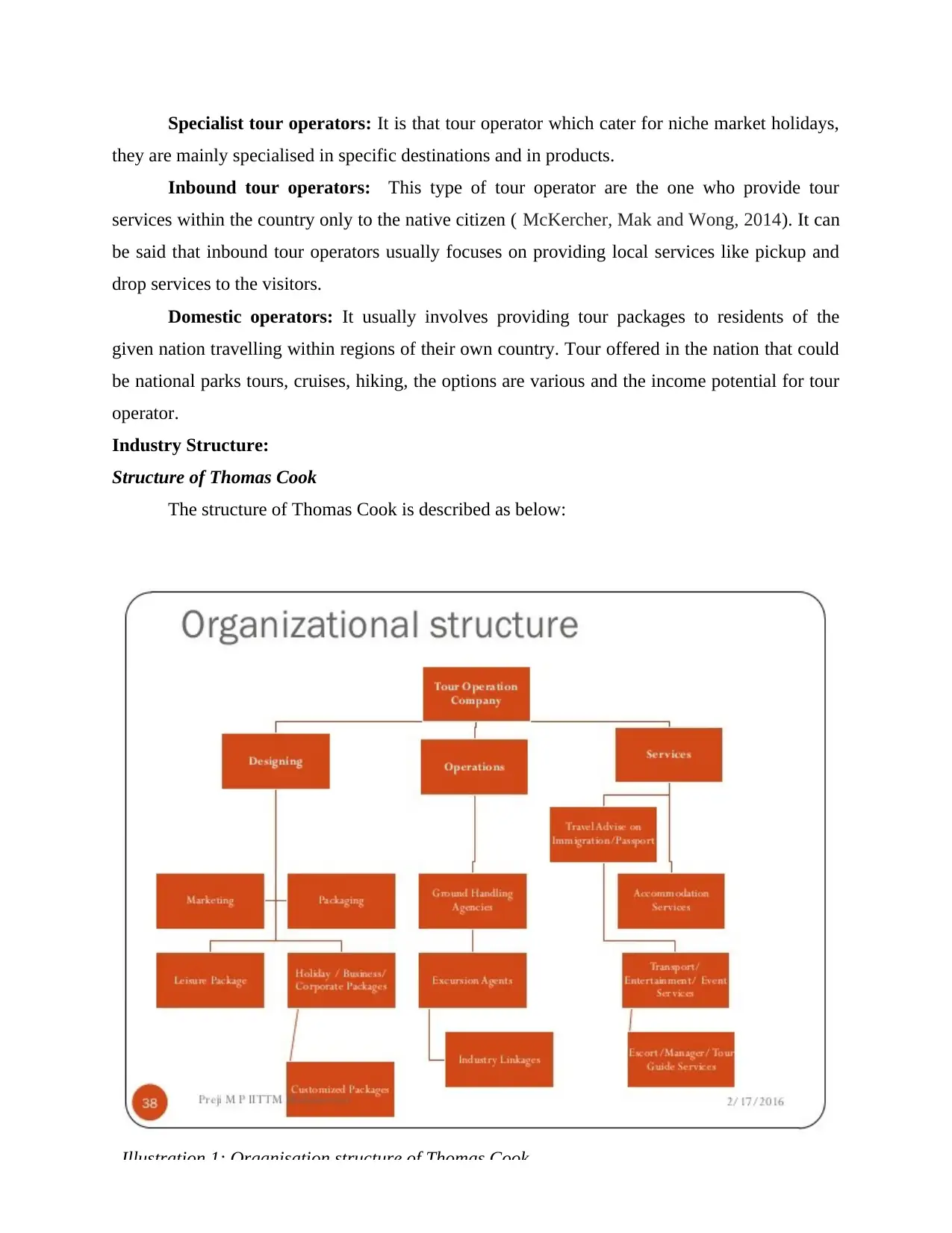
Specialist tour operators: It is that tour operator which cater for niche market holidays,
they are mainly specialised in specific destinations and in products.
Inbound tour operators: This type of tour operator are the one who provide tour
services within the country only to the native citizen ( McKercher, Mak and Wong, 2014). It can
be said that inbound tour operators usually focuses on providing local services like pickup and
drop services to the visitors.
Domestic operators: It usually involves providing tour packages to residents of the
given nation travelling within regions of their own country. Tour offered in the nation that could
be national parks tours, cruises, hiking, the options are various and the income potential for tour
operator.
Industry Structure:
Structure of Thomas Cook
The structure of Thomas Cook is described as below:
5
Illustration 1: Organisation structure of Thomas Cook
they are mainly specialised in specific destinations and in products.
Inbound tour operators: This type of tour operator are the one who provide tour
services within the country only to the native citizen ( McKercher, Mak and Wong, 2014). It can
be said that inbound tour operators usually focuses on providing local services like pickup and
drop services to the visitors.
Domestic operators: It usually involves providing tour packages to residents of the
given nation travelling within regions of their own country. Tour offered in the nation that could
be national parks tours, cruises, hiking, the options are various and the income potential for tour
operator.
Industry Structure:
Structure of Thomas Cook
The structure of Thomas Cook is described as below:
5
Illustration 1: Organisation structure of Thomas Cook
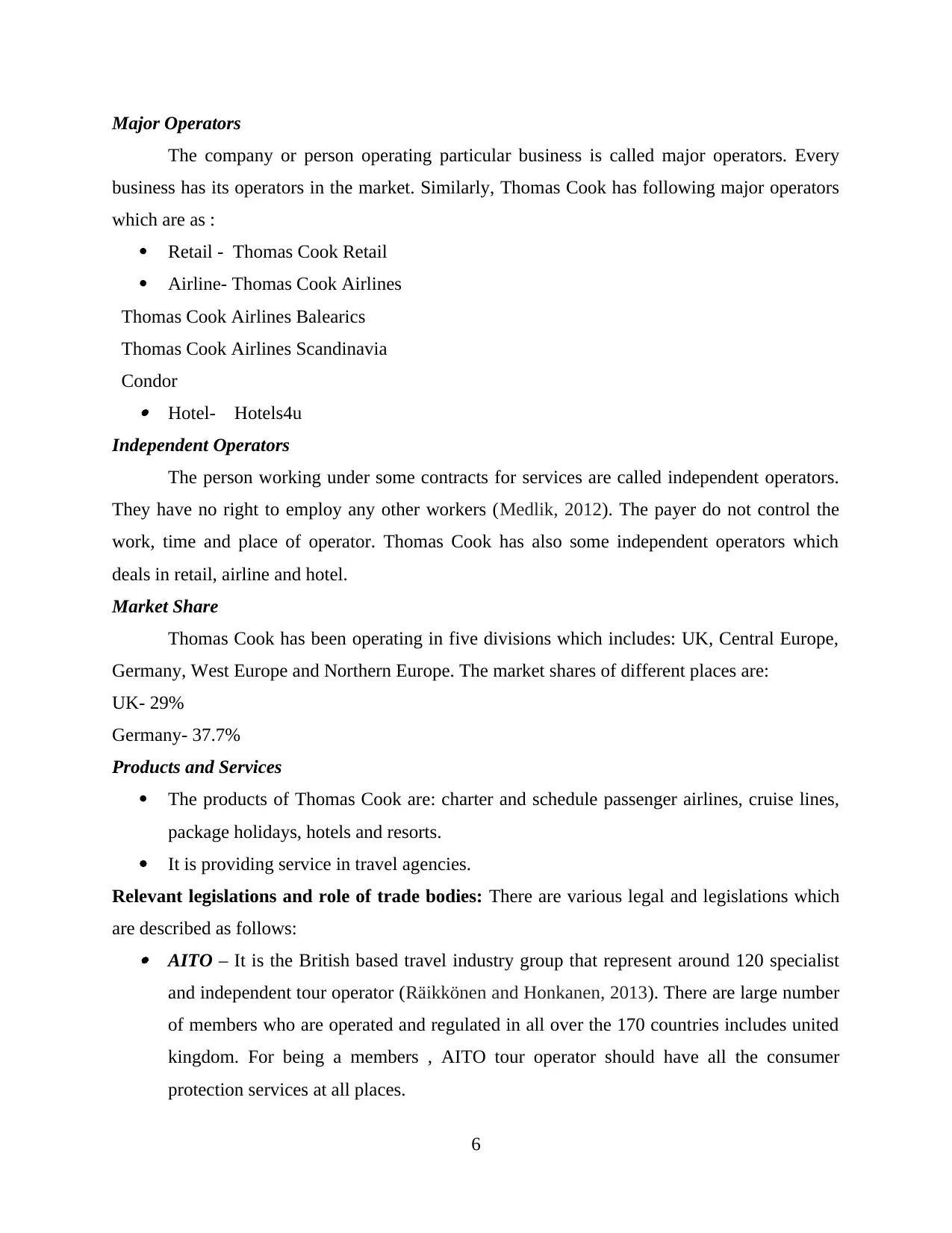
Major Operators
The company or person operating particular business is called major operators. Every
business has its operators in the market. Similarly, Thomas Cook has following major operators
which are as :
Retail - Thomas Cook Retail
Airline- Thomas Cook Airlines
Thomas Cook Airlines Balearics
Thomas Cook Airlines Scandinavia
Condor Hotel- Hotels4u
Independent Operators
The person working under some contracts for services are called independent operators.
They have no right to employ any other workers (Medlik, 2012). The payer do not control the
work, time and place of operator. Thomas Cook has also some independent operators which
deals in retail, airline and hotel.
Market Share
Thomas Cook has been operating in five divisions which includes: UK, Central Europe,
Germany, West Europe and Northern Europe. The market shares of different places are:
UK- 29%
Germany- 37.7%
Products and Services
The products of Thomas Cook are: charter and schedule passenger airlines, cruise lines,
package holidays, hotels and resorts.
It is providing service in travel agencies.
Relevant legislations and role of trade bodies: There are various legal and legislations which
are described as follows: AITO – It is the British based travel industry group that represent around 120 specialist
and independent tour operator (Räikkönen and Honkanen, 2013). There are large number
of members who are operated and regulated in all over the 170 countries includes united
kingdom. For being a members , AITO tour operator should have all the consumer
protection services at all places.
6
The company or person operating particular business is called major operators. Every
business has its operators in the market. Similarly, Thomas Cook has following major operators
which are as :
Retail - Thomas Cook Retail
Airline- Thomas Cook Airlines
Thomas Cook Airlines Balearics
Thomas Cook Airlines Scandinavia
Condor Hotel- Hotels4u
Independent Operators
The person working under some contracts for services are called independent operators.
They have no right to employ any other workers (Medlik, 2012). The payer do not control the
work, time and place of operator. Thomas Cook has also some independent operators which
deals in retail, airline and hotel.
Market Share
Thomas Cook has been operating in five divisions which includes: UK, Central Europe,
Germany, West Europe and Northern Europe. The market shares of different places are:
UK- 29%
Germany- 37.7%
Products and Services
The products of Thomas Cook are: charter and schedule passenger airlines, cruise lines,
package holidays, hotels and resorts.
It is providing service in travel agencies.
Relevant legislations and role of trade bodies: There are various legal and legislations which
are described as follows: AITO – It is the British based travel industry group that represent around 120 specialist
and independent tour operator (Räikkönen and Honkanen, 2013). There are large number
of members who are operated and regulated in all over the 170 countries includes united
kingdom. For being a members , AITO tour operator should have all the consumer
protection services at all places.
6
⊘ This is a preview!⊘
Do you want full access?
Subscribe today to unlock all pages.

Trusted by 1+ million students worldwide
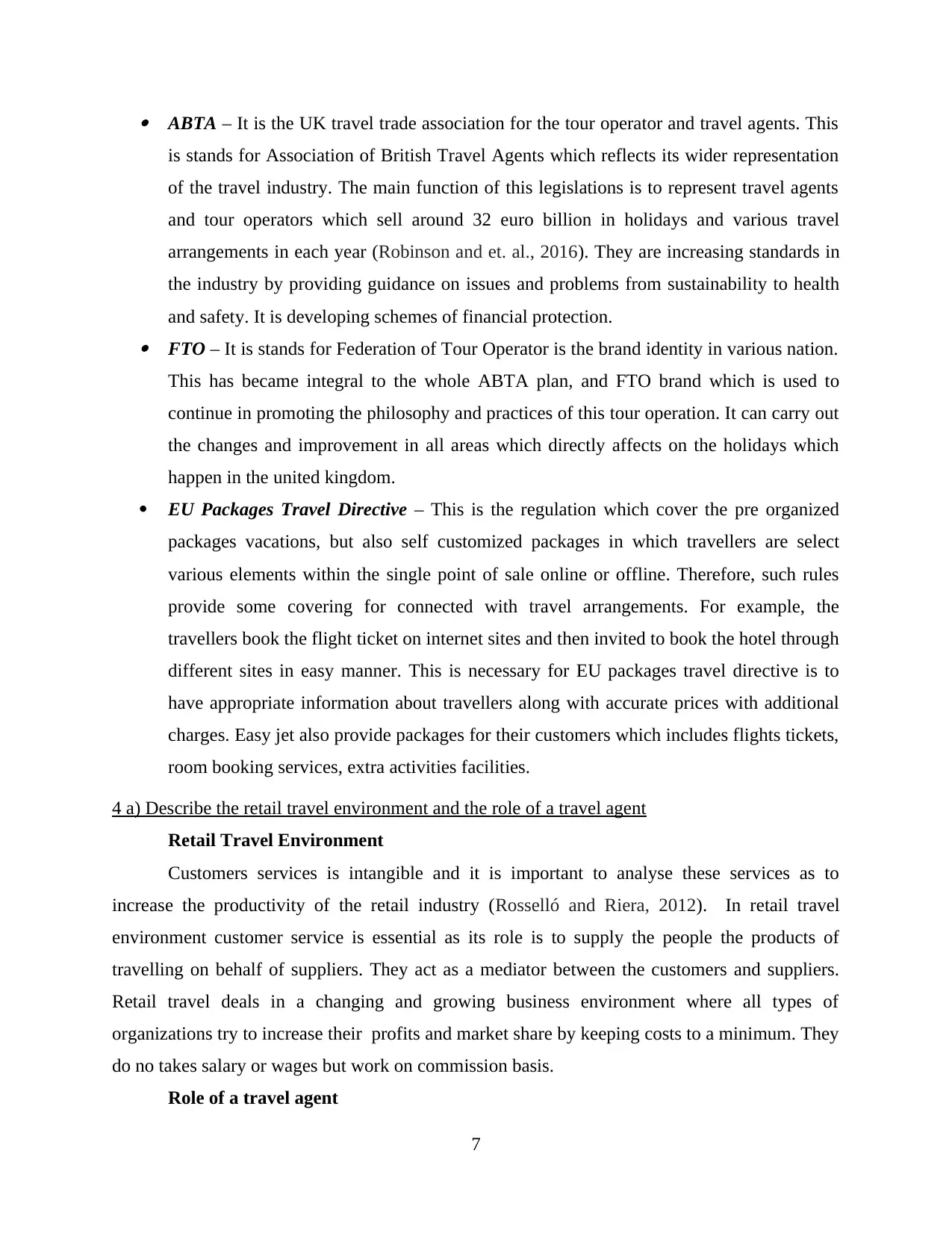
ABTA – It is the UK travel trade association for the tour operator and travel agents. This
is stands for Association of British Travel Agents which reflects its wider representation
of the travel industry. The main function of this legislations is to represent travel agents
and tour operators which sell around 32 euro billion in holidays and various travel
arrangements in each year (Robinson and et. al., 2016). They are increasing standards in
the industry by providing guidance on issues and problems from sustainability to health
and safety. It is developing schemes of financial protection. FTO – It is stands for Federation of Tour Operator is the brand identity in various nation.
This has became integral to the whole ABTA plan, and FTO brand which is used to
continue in promoting the philosophy and practices of this tour operation. It can carry out
the changes and improvement in all areas which directly affects on the holidays which
happen in the united kingdom.
EU Packages Travel Directive – This is the regulation which cover the pre organized
packages vacations, but also self customized packages in which travellers are select
various elements within the single point of sale online or offline. Therefore, such rules
provide some covering for connected with travel arrangements. For example, the
travellers book the flight ticket on internet sites and then invited to book the hotel through
different sites in easy manner. This is necessary for EU packages travel directive is to
have appropriate information about travellers along with accurate prices with additional
charges. Easy jet also provide packages for their customers which includes flights tickets,
room booking services, extra activities facilities.
4 a) Describe the retail travel environment and the role of a travel agent
Retail Travel Environment
Customers services is intangible and it is important to analyse these services as to
increase the productivity of the retail industry (Rosselló and Riera, 2012). In retail travel
environment customer service is essential as its role is to supply the people the products of
travelling on behalf of suppliers. They act as a mediator between the customers and suppliers.
Retail travel deals in a changing and growing business environment where all types of
organizations try to increase their profits and market share by keeping costs to a minimum. They
do no takes salary or wages but work on commission basis.
Role of a travel agent
7
is stands for Association of British Travel Agents which reflects its wider representation
of the travel industry. The main function of this legislations is to represent travel agents
and tour operators which sell around 32 euro billion in holidays and various travel
arrangements in each year (Robinson and et. al., 2016). They are increasing standards in
the industry by providing guidance on issues and problems from sustainability to health
and safety. It is developing schemes of financial protection. FTO – It is stands for Federation of Tour Operator is the brand identity in various nation.
This has became integral to the whole ABTA plan, and FTO brand which is used to
continue in promoting the philosophy and practices of this tour operation. It can carry out
the changes and improvement in all areas which directly affects on the holidays which
happen in the united kingdom.
EU Packages Travel Directive – This is the regulation which cover the pre organized
packages vacations, but also self customized packages in which travellers are select
various elements within the single point of sale online or offline. Therefore, such rules
provide some covering for connected with travel arrangements. For example, the
travellers book the flight ticket on internet sites and then invited to book the hotel through
different sites in easy manner. This is necessary for EU packages travel directive is to
have appropriate information about travellers along with accurate prices with additional
charges. Easy jet also provide packages for their customers which includes flights tickets,
room booking services, extra activities facilities.
4 a) Describe the retail travel environment and the role of a travel agent
Retail Travel Environment
Customers services is intangible and it is important to analyse these services as to
increase the productivity of the retail industry (Rosselló and Riera, 2012). In retail travel
environment customer service is essential as its role is to supply the people the products of
travelling on behalf of suppliers. They act as a mediator between the customers and suppliers.
Retail travel deals in a changing and growing business environment where all types of
organizations try to increase their profits and market share by keeping costs to a minimum. They
do no takes salary or wages but work on commission basis.
Role of a travel agent
7
Paraphrase This Document
Need a fresh take? Get an instant paraphrase of this document with our AI Paraphraser
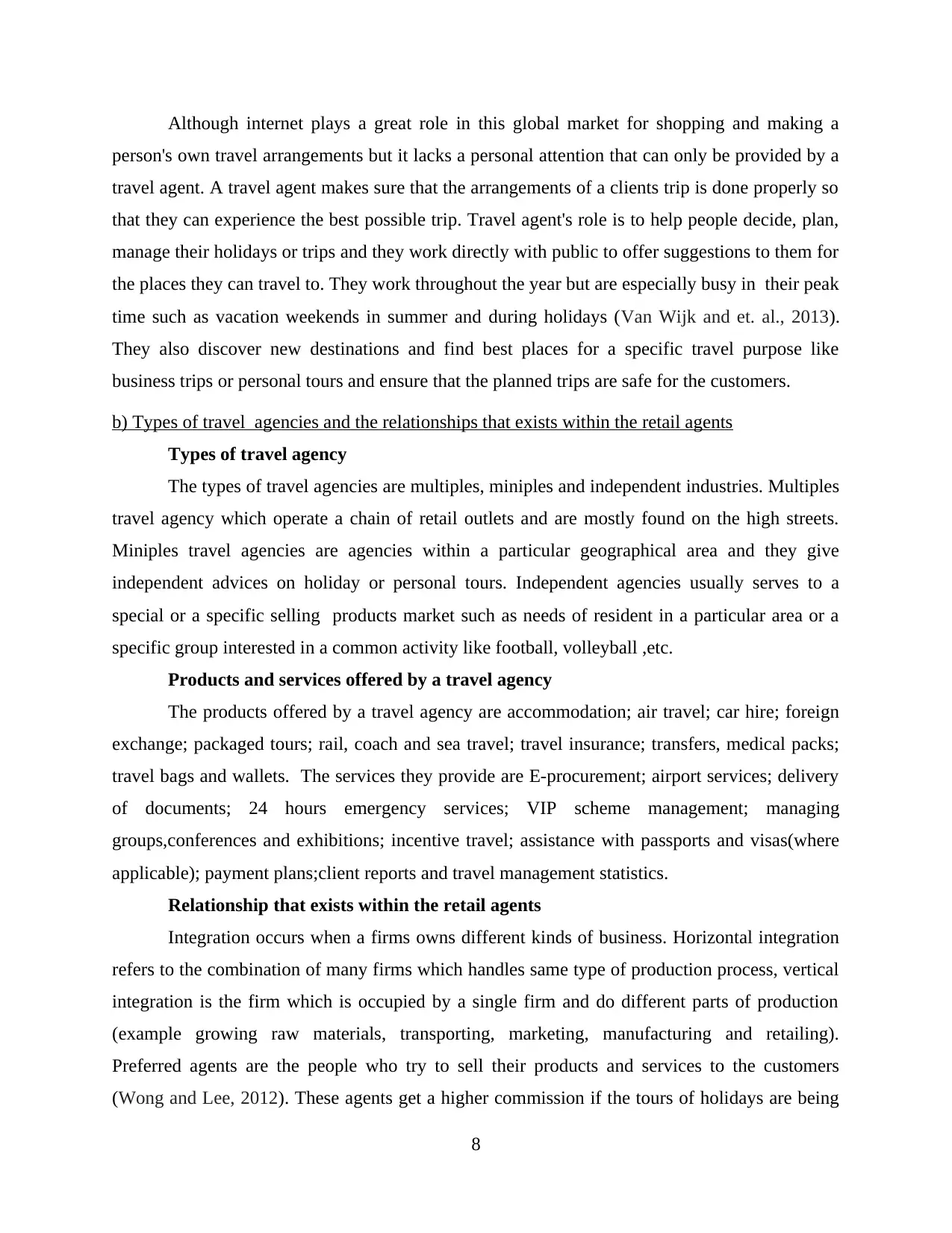
Although internet plays a great role in this global market for shopping and making a
person's own travel arrangements but it lacks a personal attention that can only be provided by a
travel agent. A travel agent makes sure that the arrangements of a clients trip is done properly so
that they can experience the best possible trip. Travel agent's role is to help people decide, plan,
manage their holidays or trips and they work directly with public to offer suggestions to them for
the places they can travel to. They work throughout the year but are especially busy in their peak
time such as vacation weekends in summer and during holidays (Van Wijk and et. al., 2013).
They also discover new destinations and find best places for a specific travel purpose like
business trips or personal tours and ensure that the planned trips are safe for the customers.
b) Types of travel agencies and the relationships that exists within the retail agents
Types of travel agency
The types of travel agencies are multiples, miniples and independent industries. Multiples
travel agency which operate a chain of retail outlets and are mostly found on the high streets.
Miniples travel agencies are agencies within a particular geographical area and they give
independent advices on holiday or personal tours. Independent agencies usually serves to a
special or a specific selling products market such as needs of resident in a particular area or a
specific group interested in a common activity like football, volleyball ,etc.
Products and services offered by a travel agency
The products offered by a travel agency are accommodation; air travel; car hire; foreign
exchange; packaged tours; rail, coach and sea travel; travel insurance; transfers, medical packs;
travel bags and wallets. The services they provide are E-procurement; airport services; delivery
of documents; 24 hours emergency services; VIP scheme management; managing
groups,conferences and exhibitions; incentive travel; assistance with passports and visas(where
applicable); payment plans;client reports and travel management statistics.
Relationship that exists within the retail agents
Integration occurs when a firms owns different kinds of business. Horizontal integration
refers to the combination of many firms which handles same type of production process, vertical
integration is the firm which is occupied by a single firm and do different parts of production
(example growing raw materials, transporting, marketing, manufacturing and retailing).
Preferred agents are the people who try to sell their products and services to the customers
(Wong and Lee, 2012). These agents get a higher commission if the tours of holidays are being
8
person's own travel arrangements but it lacks a personal attention that can only be provided by a
travel agent. A travel agent makes sure that the arrangements of a clients trip is done properly so
that they can experience the best possible trip. Travel agent's role is to help people decide, plan,
manage their holidays or trips and they work directly with public to offer suggestions to them for
the places they can travel to. They work throughout the year but are especially busy in their peak
time such as vacation weekends in summer and during holidays (Van Wijk and et. al., 2013).
They also discover new destinations and find best places for a specific travel purpose like
business trips or personal tours and ensure that the planned trips are safe for the customers.
b) Types of travel agencies and the relationships that exists within the retail agents
Types of travel agency
The types of travel agencies are multiples, miniples and independent industries. Multiples
travel agency which operate a chain of retail outlets and are mostly found on the high streets.
Miniples travel agencies are agencies within a particular geographical area and they give
independent advices on holiday or personal tours. Independent agencies usually serves to a
special or a specific selling products market such as needs of resident in a particular area or a
specific group interested in a common activity like football, volleyball ,etc.
Products and services offered by a travel agency
The products offered by a travel agency are accommodation; air travel; car hire; foreign
exchange; packaged tours; rail, coach and sea travel; travel insurance; transfers, medical packs;
travel bags and wallets. The services they provide are E-procurement; airport services; delivery
of documents; 24 hours emergency services; VIP scheme management; managing
groups,conferences and exhibitions; incentive travel; assistance with passports and visas(where
applicable); payment plans;client reports and travel management statistics.
Relationship that exists within the retail agents
Integration occurs when a firms owns different kinds of business. Horizontal integration
refers to the combination of many firms which handles same type of production process, vertical
integration is the firm which is occupied by a single firm and do different parts of production
(example growing raw materials, transporting, marketing, manufacturing and retailing).
Preferred agents are the people who try to sell their products and services to the customers
(Wong and Lee, 2012). These agents get a higher commission if the tours of holidays are being
8
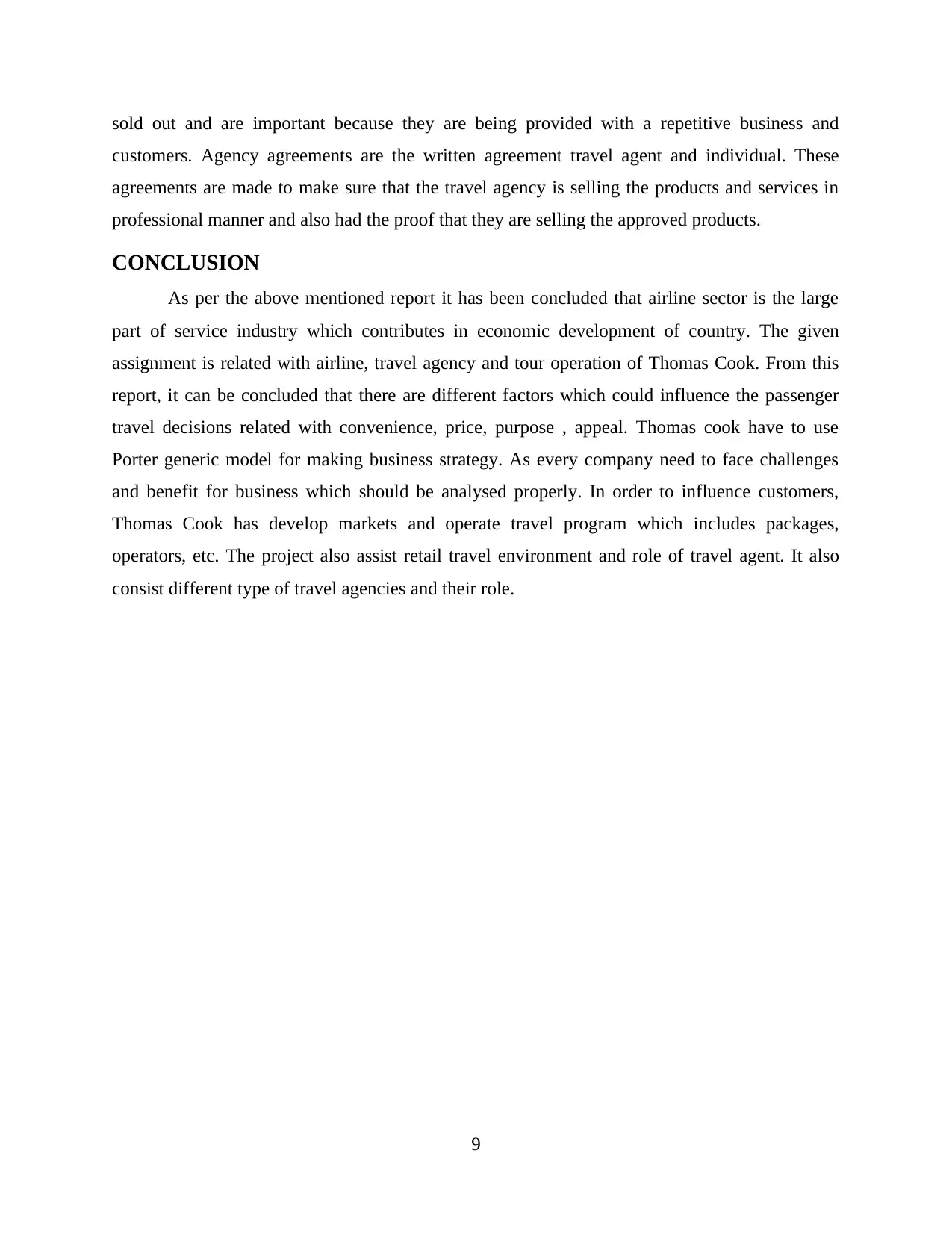
sold out and are important because they are being provided with a repetitive business and
customers. Agency agreements are the written agreement travel agent and individual. These
agreements are made to make sure that the travel agency is selling the products and services in
professional manner and also had the proof that they are selling the approved products.
CONCLUSION
As per the above mentioned report it has been concluded that airline sector is the large
part of service industry which contributes in economic development of country. The given
assignment is related with airline, travel agency and tour operation of Thomas Cook. From this
report, it can be concluded that there are different factors which could influence the passenger
travel decisions related with convenience, price, purpose , appeal. Thomas cook have to use
Porter generic model for making business strategy. As every company need to face challenges
and benefit for business which should be analysed properly. In order to influence customers,
Thomas Cook has develop markets and operate travel program which includes packages,
operators, etc. The project also assist retail travel environment and role of travel agent. It also
consist different type of travel agencies and their role.
9
customers. Agency agreements are the written agreement travel agent and individual. These
agreements are made to make sure that the travel agency is selling the products and services in
professional manner and also had the proof that they are selling the approved products.
CONCLUSION
As per the above mentioned report it has been concluded that airline sector is the large
part of service industry which contributes in economic development of country. The given
assignment is related with airline, travel agency and tour operation of Thomas Cook. From this
report, it can be concluded that there are different factors which could influence the passenger
travel decisions related with convenience, price, purpose , appeal. Thomas cook have to use
Porter generic model for making business strategy. As every company need to face challenges
and benefit for business which should be analysed properly. In order to influence customers,
Thomas Cook has develop markets and operate travel program which includes packages,
operators, etc. The project also assist retail travel environment and role of travel agent. It also
consist different type of travel agencies and their role.
9
⊘ This is a preview!⊘
Do you want full access?
Subscribe today to unlock all pages.

Trusted by 1+ million students worldwide
1 out of 13
Related Documents
Your All-in-One AI-Powered Toolkit for Academic Success.
+13062052269
info@desklib.com
Available 24*7 on WhatsApp / Email
![[object Object]](/_next/static/media/star-bottom.7253800d.svg)
Unlock your academic potential
Copyright © 2020–2026 A2Z Services. All Rights Reserved. Developed and managed by ZUCOL.





